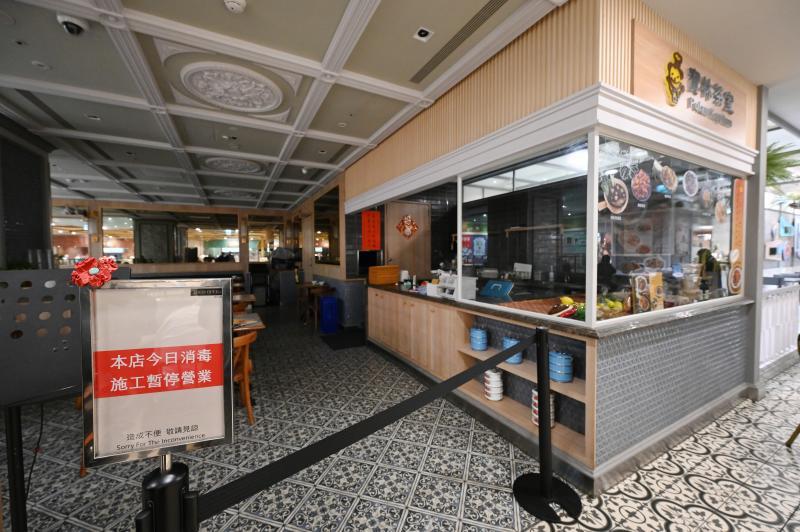The Taipei District Prosecutors’ Office today formally charged six people involved in a food poisoning incident at a Polam Kopitiam (寶林茶室) restaurant in March last year.
Six people died and 33 fell ill after ingesting bongkrek acid traced to the restaurant’s noodle dishes between March 19 and 24 at the Far Eastern Sogo Xinyi A13 Department Store.
Prosecutors today said they have charged five people for contravening the Act Governing Food Safety and Sanitation (食品安全衛生管理法) and negligence causing death.

Photo: Tien Yu-hua, Taipei Times
The five are franchise owner Li Fang-hsuan (黎仿軒), store manager Wang Shun-te (王順德), substitute cook Ho Ching-fu (胡清富), head chef Chou Jih-hao (周日豪) and an intern surnamed Juan (阮).
Prosecutors said they are seeking a sentence of more than four years for Li, four years and two months for Ho, a heavy punishment for Chou, and “appropriate penalties” for Wang and Juan.
From March 14 to 17, temperatures in Xinyi District (信義) gradually rose before dropping again on March 18, meaning that the store’s air-conditioning system was turned off after business hours, prosecutors said.
Combined with cleaning procedures at the restaurant, which involved washing the kitchen floor with water that drained into a gutter, this created a hot and humid environment conducive to the type of bacteria that can produce bongkrek acid, prosecutors said.
On March 16, Chou, Juan and Ho left a basket of uneaten noodles unrefrigerated, which was then used over the subsequent days to make meals for customers, prosecutors said.
By March 19, when the noodles had been unrefrigerated for more than 63 hours, Ho used them in meals and mixed the contaminated noodles in with other ones, which were also left outside of the store’s refrigerator up until March 24, prosecutors said.
This resulted in 33 people over those few days falling ill, suffering from nausea, diarrhea and other injuries, leading to six deaths, prosecutors said.

Three Taiwanese airlines have prohibited passengers from packing Bluetooth earbuds and their charger cases in checked luggage. EVA Air and Uni Air said that Bluetooth earbuds and charger cases are categorized as portable electronic devices, which should be switched off if they are placed in checked luggage based on international aviation safety regulations. They must not be in standby or sleep mode. However, as charging would continue when earbuds are placed in the charger cases, which would contravene international aviation regulations, their cases must be carried as hand luggage, they said. Tigerair Taiwan said that earbud charger cases are equipped

Foreign travelers entering Taiwan on a short layover via Taiwan Taoyuan International Airport are receiving NT$600 gift vouchers from yesterday, the Tourism Administration said, adding that it hopes the incentive would boost tourism consumption at the airport. The program, which allows travelers holding non-Taiwan passports who enter the country during a layover of up to 24 hours to claim a voucher, aims to promote attractions at the airport, the agency said in a statement on Friday. To participate, travelers must sign up on the campaign Web site, the agency said. They can then present their passport and boarding pass for their connecting international

WEATHER Typhoon forming: CWA A tropical depression is expected to form into a typhoon as early as today, the Central Weather Administration (CWA) said yesterday, adding that the storm’s path remains uncertain. Before the weekend, it would move toward the Philippines, the agency said. Some time around Monday next week, it might reach a turning point, either veering north toward waters east of Taiwan or continuing westward across the Philippines, the CWA said. Meanwhile, the eye of Typhoon Kalmaegi was 1,310km south-southeast of Oluanpi (鵝鑾鼻), Taiwan’s southernmost point, as of 2am yesterday, it said. The storm is forecast to move through central

Taiwan sweltered through its hottest October on record, the Central Weather Administration (CWA) said yesterday, the latest in a string of global temperature records. The main island endured its highest average temperature since 1950, CWA forecaster Liu Pei-teng said. Temperatures the world over have soared in recent years as human-induced climate change contributes to ever more erratic weather patterns. Taiwan’s average temperature was 27.381°C as of Thursday, Liu said. Liu said the average could slip 0.1°C by the end of yesterday, but it would still be higher than the previous record of 27.009°C in 2016. "The temperature only started lowering around Oct. 18 or 19